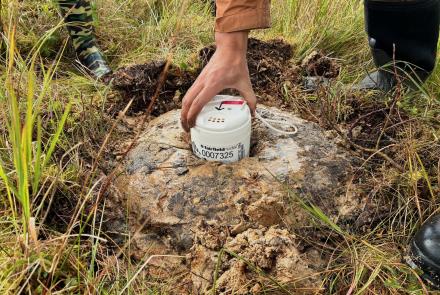The Turkey and the Tambalacoque Tree
Friends of mine used to raise two turkeys every year. Being practical and unsentimental people, they named one Christmas and one Thanksgiving. More sensitive souls may justify eating a domestic turkey with the idea that the bird has about the intellect---as well as the figure---of a sofa pillow. Seen in that light, consuming the traditional holiday bird is more like eating a stuffed rutabaga than dining on a real animal.
To undercut that dubious consolation, and in memory of Thanksgivings past, I offer the true story of how ordinary domestic turkeys played a key role in saving an entire species of tree from extinction.
The year was 1973. The place was Mauritius, the large and tropically warm island lying in the Indian Ocean. The problem was the decline of the tambalacoque tree, a once common and useful source of timber for the island residents. Only thirteen of the trees remained, and they were sickly specimens.
Stanley Temple, a scientist in the department of wildlife ecology at the University of Wisconsin, Madison, found himself discussing the problem with Mauritian foresters. The local experts reported that the trees looked poorly because they were all ancient; none were younger than about 300 years. The elderly trees still produced seeds, but none of the seeds gerrninated, even when carefully tended under ideal nursery conditions.
It was tempting to think the old trees were incapable of producing healthy seeds, but Temple didn't accept that reasoning. For one thing, the seeds (and their encasing fruit) looked fine. A Tambalacoque seed is enclosed within a thick-walled tough pit, which is embedded within a pulpy fruit---something like a round avocado about two inches in diameter. If the surviving trees were too weak to produce live seeds, the fruits should show defects. Then too, if age was the problem, the trees should have produced viable seeds when they were younger. But there were no seedlings, saplings, or younger trees to show that seeds had ever sprouted. Temple decided the seeds weren't germinating because something had changed in the way the environment treated tambalacoque fruits. Going by the age of surviving trees, the change had occurred about 300 years earlier.
Temple deduced what that change had been. By 1681, the last of Mauritius' most famous residents had died---the dodo bird. Dodos were flightless, big, and edible. They were also innocent of experience with humans, and that marked their doom and left their name unfairly synonymous with stupidity.
Though the explorers and early settlers of Mauritius left few records of dodo behavior, they did remark that the birds fed on fruits and seeds. And fossil tambalacoque pits had been found among the skeletal remains of long-gone dodos.
Temple knew that some seeds need the processing of an animal's innards before they sprout. The grinding of a big bird's gizzard might abrade away enough of the stony pit so that the seed within could sprout through. If it passed out of the digestive system uncrushed, the seed might even start sprouting in a handy pat of fertilizer.
Theory sounded good; calculations of tambalacoque pit strength and probable dodo gizzard forces looked promising. Temple believed that a simple experiment would establish that tambalacoque seeds would sprout after a dodo ate tambalacoque fruit---except, of course, that there were no more dodos.
Temple thought of a bird often called dumb as a dodo and nearly as big. He drafted a flock of turkeys to serve in the cause of science. They were not interested in eating whole tambalacoque fruit, but he convinced them to eat the pits anyhow. Some pits made it through, ground down by turkey gizzards.
And a few sprouted into healthy infant tambalacoque trees, the first seen on Mauritius in three centuries.
So that is how the lowly turkey saved the tambalacoque tree from following the dodo into extinction. There are more young tambalacoques on Mauritius now, grown from seeds scratched and scraped by the foresters' hands; the turkeys are no longer needed. They earned an honorable retirement, but I suspect they didn't get one---even though Thanksgiving is not celebrated on Mauritius.




